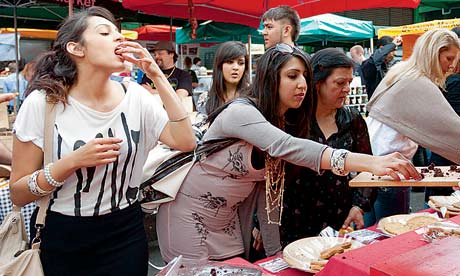
Shopping for luxury goods is an act of acute narcissism. It's all about the positive light in which we view ourselves, and the unnecessary rewards we think we deserve or, even worse, need, as a result. That Mulberry handbag! Those Manolo Blahniks! The joyously slinky iPad 2! Gimme! Shopping in a modern British farmers' market is exactly the same kind of narcissistic act, only it comes with a greasy veneer of self-righteousness. It doesn't feel like that, of course. Wandering from the artisan breadmaker to the cheese guy to the bloke who only sells beef from wild cattle that are slaughtered lovingly to the wafting melodies of Verdi, feels like a sacrament, a physical expression of an ideology. It's like Hare Krishnas donning the saffron robes – an outward expression of a belief.
I am one of those people. It is a sign of my weakness as a cook that I imagine I always make better food if the ingredients have come from, say, Borough Market: a kilo of dinky clams from the fish place at the back, a slab of pork belly from the Ginger Pig, complete with nipples (because proper cooks do not recoil at such things; I am a proper cook, ergo I celebrate the piggy nipple), a bucket of high-grade Devonshire cream which could harden an artery at 20 paces, a few punnets of raspberries from the teeny-weeny family-owned farm in Cliché-on-Sea. Hurrah! I am a complete and rounded person, and not merely as a result of all those animal and dairy fats.
We believe that, in spending ludicrous sums on this wonderful food, we are making a stand against The Man. We are turning our faces against the supermarkets, promoting true British agriculture, supporting a way of life that is in danger of being lost. There is a technical term for all this: bollocks. Buying a £17 organic free-range heritage chicken from Borough is no more a challenge to the supermarkets than buying a £1,000 Mulberry handbag is a challenge to Primark. Indeed, the supermarkets do what they do precisely because there is someone out there flogging a chicken for £17; because they can offer a product at half the cost which is not half the quality.
This is not to say that shopping in farmers' markets is a pointless act. We just need to understand our motives for doing so and the benefit it brings. In the same way that, by buying that handbag you are ensuring the continuation of artisan handbag-making skills, shopping for the good stuff helps maintain a bunch of practices that might otherwise be lost. Likewise, some of what goes on at the top end of the market trickles down to the bottom. Just as the buyers from Primark keep an eye on the big fashion shows, so the supermarkets watch farmers' markets. They learn lessons about the importance of touchy-feely marketing narratives and seize upon food trends, which they then industrialise and do cheaper.
What we are not doing is harking back to a bygone era. Farmers' markets mythologise Britain, create a version of it that never existed, when horny-handed peasants lived on prime cuts of happy pig and lashings of thick cream the colour of buttercups. Our great grandparents never ate this well. They couldn't afford to. Don't let any of this put you off shopping in farmers' markets: it's a noble way to pass the time. Just don't think you're changing the world by doing so.

